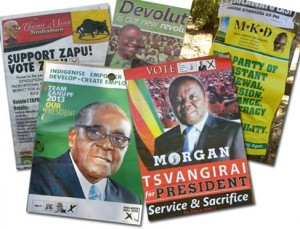Is Zimbabwe heading towards another disputed election?
By Brian Raftopoulos
As Zimbabwe’s elections on 31 July approach, the Southern African Development Community is under pressure to complete its mandate from 2007.
In September 2008 the three major political parties in Zimbabwe entered an inclusive government following a contested election in June that year. The Global Political Agreement (GPA), as it was called, was facilitated by the Southern African Development Community (SADC), and the facilitation was led by the South African government.
After nearly five years under a very problematic and intensely contested inclusive arrangement, the people of Zimbabwe face another election on the 31st July in a battle for the presidency, parliament and council representatives. The setting of the election date was announced unilaterally by President Mugabe, following a decision by the constitutional court clearly directed by Mugabe’s party.
This was contrary to the terms of the GPA which set out that this decision would be made by consensus of the three political parties, Zanu PF, MDC-T and the smaller MDC formation. Mugabe’s failure to abide by the terms of the GPA on this issue represented the latest in a long list of infringements by his party on the terms of the agreement.
Many of the key reforms envisaged under the GPA, such as media reform, substantive changes in the electoral laws and security sector realignment were blocked by Mugabe’s party in the last five years. The latter issue was particularly important given the fact that the security establishment effectively blocked the MDCs from translating their electoral victory into state power in 2008.
As a result, the forthcoming election is taking place under conditions which once again bode ill for the conduct of a free and fair plebiscite. The combination of a shortened voter registration period and a voter’s roll which, according to recent reports contains serious irregularities, point to further problems around the electoral process. The chaos surrounding the recently conducted special vote for the security forces provided yet another indication of the lack of readiness of the national electoral body for the July election.
The current state of unreadiness for the election has also been a cause of continuous concern for SADC. Since 2011 a series of SADC summits has pushed the GPA partners to implement all the political reforms set out in the GPA. At its June summit in Maputo the SADC facilitator on Zimbabwe, South African President Zuma, once again stressed the need for all matters agreed on under the GPA to be implemented speedily in order to ensure adequate preparations for a level playing field for the forthcoming elections.
Among the range of issues raised by Zuma in his report was the key point that security sector realignment could not be postponed any longer. The summit also called on the Zimbabwe parties to seek an extension of the election date from the Zimbabwe constitutional court, in order to ensure greater readiness for the election. Once again Zanu PF ensured the constitutional court decision endorsed the 31 July election date. In response to the recent disorganised special vote process, SADC stated that it wished its advice had been heeded on the need for a delay.
There have clearly been tensions between Mugabe and his SADC colleagues over the problems of implementing the GPA. Mugabe’s recent attacks on one of the SADC facilitatiors, Lindiwe Zulu, over her alleged criticisms of the electoral process, point to some longer terms problems that Mugabe’s party have had with Zuma’s arbitration.
Additionally the growing convergence between SADC and the EU since the beginning of 2013 over the conditions for a free and fair election, have triggered concerns in Zanu PF. For much of the 2000’s including the period of the inclusive government, Mugabe has skillfully used the division between SADC and the West over the sanctions imposed by the latter in the early 2000’s on the Mugabe regime, to maintain the support of the region. The gradual movement away from the sanctions position by the EU, from 2012, and the clear movement of the EU towards an EU-Zimbabwe re-engagement dependent on the status of the upcoming election have closed the ground between the EU and SADC.
The pressure is therefore on the regional body to carry out the mandate that it set itself when the facilitation began in 2007. In that year the SADC mediation set out to establish conditions for a generally acceptable election in Zimbabwe and to “ensure that everybody concerned accepts that the results of the elections as truly representative of the will of the people.” The facilitator at that time, the then South African President Thabo Mbeki, was keen to keep the West at bay and to push for an African solution to an African problem. That task remains to be completed in Zimbabwe, and the stakes in the forthcoming elections are high not only for Zimbabweans, but also for the credibility of SADC.




